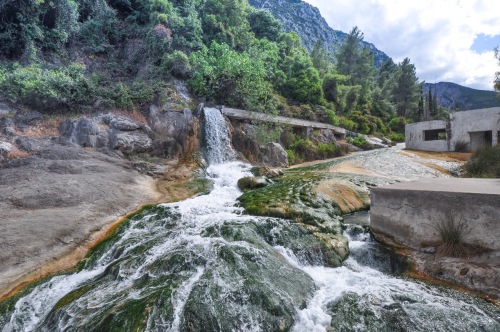On a recent trip to Greece we had a chance to revisit the site of Thermopylae where 300 Spartans and 700 Thespians slowed the advance of the Persian army towards Athens (see below for description and map). Thermopylae actually means “hot gateway” and for the first time we actually visited the hot springs still exist in the area!

The Hot Water Springs of Thermopylae (“hot gateway”) — Note the modern aqueduct that diverts water to this area — Click on Image to Enlarge and/or Download
In ancient times Thermopylae guarded a narrow, sea level, “pass” between mountains on the southwest and the sea on the northeast.

View from top of Kolonos Hill—where the Spartans and Thespians made their last stand—looking northwest towards the area of the hot water springs — Click on Image to Enlarge and/or Download
Here in 480 B.C., 300 Spartans and 700 Thespians (temporarily) held off about 300,000 invading Persians led by Xerxes. The stalled Persians eventually sent a force of men around Leonidas’ forces, through the mountains to the west of the pass thus encircling the Spartans from in front and behind in the pass.
The Spartans and Thespians fought valiantly, but eventually all, save two, were killed in battle. The Persians continued their advance on Athens and burned the city. But in pursuit of the Athenians, by land and by sea, they were defeated that year off the island of Salamis. Their final defeat came the next year at the battle of Plataea and the (brief) era of peace that followed ushered in the classical period of Greek history.

Modern monument honoring Leonidas and his three hundred warriors — Click on Image to Enlarge and/or Download
To View 11 High Resolution Images of Thermopylae Click Here
Actually, because of its strategic location a number of battles have been fought at Thermopylae, but the above was the “signature” event.

